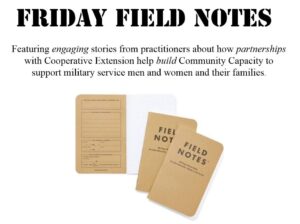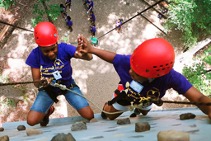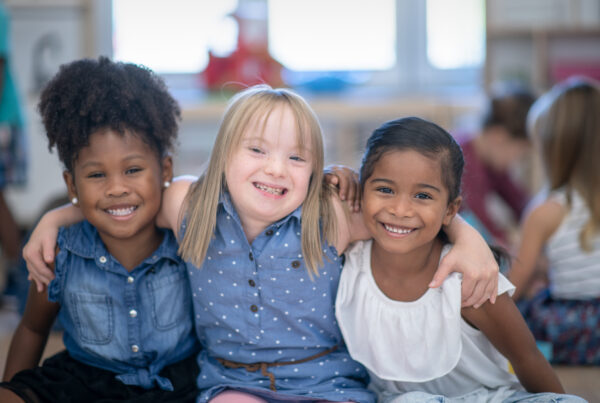
If you’re reading this week’s Friday Field Notes (or on the OneOp website to begin with), then you are most likely already very familiar with the unique challenges and stressors that military families can face. Similarly, you may already know that parents, spouses, and/or children of military families are incredibly resilient as well. However, resilience is a trait that must be cultivated and community connections, like the ones we promote in Community Capacity Building, play a large role in developing it. This week, we will take a closer look at the role that communities and nature-based can play in promoting resilience and overall wellness of military families.

About Military Families
According to Masten (as cited in Mancini, O’Neal, & Lucier-Greer, 2020), military families wrestle with some of the same challenges that civilian families face, while they also deal with stressors that civilian families may never face. These stressors can include PCS (permanent change of station), deployment, uncertainty regarding where a deployed family member is or if he/she is safe, and reintegration of a service member back into normal family roles after deployment.
- Military members and their families comprise one of the largest workforces in the United States (DoD, 2018)
- 3 million DoD active duty service members
- Approximately 40% of service members have two or more minor children (Huebner, 2019)
With these numbers, it is easy to see why military families require additional support during times of stress. Just like civilian families, though, community resources can be used to manage stress and transitions. Resources can include informal networks like friends, family, and colleagues, as well as more formal support systems. One of the most renowned formal support systems is family life education (FLE). FLE focuses on delivering information, educational programs, and services to families on various topics with the mission to foster resilience when challenges arise (Mancini, O’Neal, & Lucier-Greer, 2020).
Using FLE, service providers working with military families can become more familiar with resources, such as Outdoor Rx and other nature-based initiatives, that can promote community involvement during transitions to ultimately benefit military families.

Family Roles’ Impact on Community Connectedness
O’Neal, Mallette, and Mancini (2018) state that parents play a crucial role in connecting to community resources. The negative perceptions that parents hold of their community can negatively affect parent-child relationships and youth outcomes. Conversely, positive perceptions of community (i.e., being trustworthy and beneficial) lead to better parent-child relationships and youth tend to fare better through transitions. Using this information, service providers can target parents by providing resources for the whole family rather than programs solely directed at children or adolescents. Furthermore, engagement in one’s community is linked to adult well-being and an increased ability to cope with stressors and demonstrate resilience.
Implications & Resources
As mentioned in previous Friday Field Notes, increased social connectedness is a benefit of nature-based recreation. Outdoor Rx claims that 12 is the average age that children need to be exposed to nature in order to develop an appreciation for nature and conservation as an adult. With this in mind, the Cooperative Extension System has programs specifically for military families, such as 4-H & Positive Youth Development and Military Teen Adventure Camps. Using the resources that are already in communities, service providers can connect military families to them to ease the transitions that come along with military life.

Making use of initiatives like Outdoor Rx or Park Rx is beneficial for military and civilian families alike, but with the added stressors of military life, promoting interactions with the environment can help mitigate the negative impacts that uncertainty and stress of military life can have on all family members.
Join us next week as we explore how Outdoor Rx is related to Total Force Fitness. And don’t forget to follow us on Twitter for updates throughout this series!
References
Department of Defense. (2018). 2017 demographics: Profile of the military community. Office of the Deputy Assistant Secretary of Defense. Retrieved from https://download.militaryonesource.mil/12038/MOS/Reports/2017-demographics-report.pdf
Huebner, C. R. (2019). Health and mental health needs of children in US military families. Pediatrics, 143(1), 1–13. https://doi.org/10.1542/peds.2018-3258.
Mancini, J. A., O’Neal, C. W., & Lucier-Greer, M. (2020). Toward a framework for military family life education: Culture, context, content, and practice. Interdisciplinary Journal of Applied Family Science.
O’Neal, C. W., Mallette, J. K., & Mancini, J. A. (2018). The importance of parents’ community connections for adolescent well-being: An examination of military families. American Journal of Community Psychology, 61. 204-217.



![Blog Post Image: Pexels [Silhouette Photo of Jumping Children, photo by Margaret Weir, Sept. 22, 2017, CC0]](https://oneop.org/wp-content/uploads/2024/04/pexels-margaret-weir-620530-600x403.jpg)










